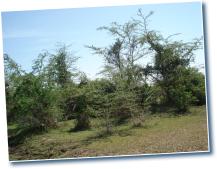|

March, 2009 - some more
Because the school does not have a kitchen or dining hall, the cooks continue to prepare food on large stones over a wood burning fire and the students eat just sitting on the ground. We had another severe water crisis
for several weeks in February. The girls had to walk about one and a half kilometers each direction to a creek of water to bring a bucket of water for kitchen use and another trip for water for their personal bathing and washing of clothes. In typical African style, they carried these large, heavy buckets on their heads.
Life has been challenging in many respects, especially for us who are so used to just turning on a light switch or opening a water tap. Thank you so much for all your prayers for rain for us.
We are truly blessed to have two priests as full time teachers. Father Gregory Helminski, C.R. teaches all English classes and is the Academic Master. Father Godfrey Maruru teaches Social Studies and is the Second Master. This also means that we
have daily Mass for half the student body each day. We can only fit half of the school in our chapel, so when we have Mass for the entire school, we must have it outdoors and the girls just sit on the ground.
It is such a joy to see so many of our girls make a visit or more each day to pray before the Blessed Sacrament. I wish you could hear their enthusiastic singing at Mass or the Stations of the Cross.
Of course, with the expanded student body, we have had to hire many Tanzanian teachers. Sister Beata has done a wonderful job as the new Headmistress as she keeps juggling all the classes and the subjects that teachers teach. We had some teachers who failed to come to school. Then we had to dismiss one teacher and another had a baby the second week of school. Tanzanian schools, especially in remote areas like ours, need to provide staff housing for teachers. We do not have any staff housing and so our staff sleeps in a Muslim run Mosque hostel over 7 km away from the school. For this reason, we need to drive them back and forth each day and provide all three meals a day for them.
The school day begins with Parade, prayers and the solemn singing of the National Anthem while the flag is respectfully raised each morning. Classes begin at 7:30 a.m. and continue to 5:30 p.m. with a break for breakfast at 10:45 a.m. and lunch at 2:15 p.m. Because we started school a month late, we are making up that time with classes on Saturdays, with a mid-term break of just a few days and with plans to teach most of June when Secondary School have their month-long vacation between terms or semesters.
We are especially proud of the fact that in only our second year of existence, we have started a solar powered computer laboratory and a science laboratory. Thanks to the generosity of donors, we have been able to install a solar system that powers batteries that run our 15 new computers. This has been especially helpful for periods like March where we had 14 straight days with just an hour or so of electricity a day a day and accompanying electrical surges that ruin computers and monitors. In spite of this, we were able to hold our computer laboratory classes as scheduled. Solar experts have told us that we are the first school in Tanzania and perhaps in all of East Africa which has this kind of a computer laboratory.
We also have a young, enthusiastic volunteer physics teacher from the United Kingdom who teaches part time at our school and brings some of the lab equipment from his other school, a local high school for boys that has well equipped science laboratories. It is truly heartwarming to see the delightful reactions of our girls as they use these computer and science laboratories.
Yes, our students have wonderful opportunities to develop their many talents. It has been a joy to see our Form 2 students so seriously take on leadership roles in the school this year. I believe that they are truly benefiting from our Resurrection system of education to prepare them to be leaders in the Church, in society and in their families. We thank God and praise Him for that.
Every once in a while, however, the harsh reality of tribal life with its witch doctors and myriad regulations surprises us and makes us realize that in spite of all the educational opportunities we provide, ours is still truly a mission ministry that at times resembles life of a century or so ago. Please, keep us in prayer.
Sister Stephanie CR
|